Critical Analysis: Euthanasia Debate & Section 31C Crimes Act 1900 NSW
VerifiedAdded on 2023/06/08
|12
|2986
|315
Essay
AI Summary
This essay delves into the complex legal and ethical issues surrounding euthanasia, focusing on the application and validity of Section 31C of the Crimes Act 1900 (NSW), which criminalizes assisting suicide. It presents arguments for and against euthanasia, drawing from philosophical, legal, and human rights perspectives. The analysis includes a discussion of relevant case laws, international covenants, and legislative attempts to amend the law, highlighting the ongoing debate in Australia regarding the right to die and the need for legal reform. The essay concludes by emphasizing the importance of balancing individual rights with societal values in the context of end-of-life decisions.
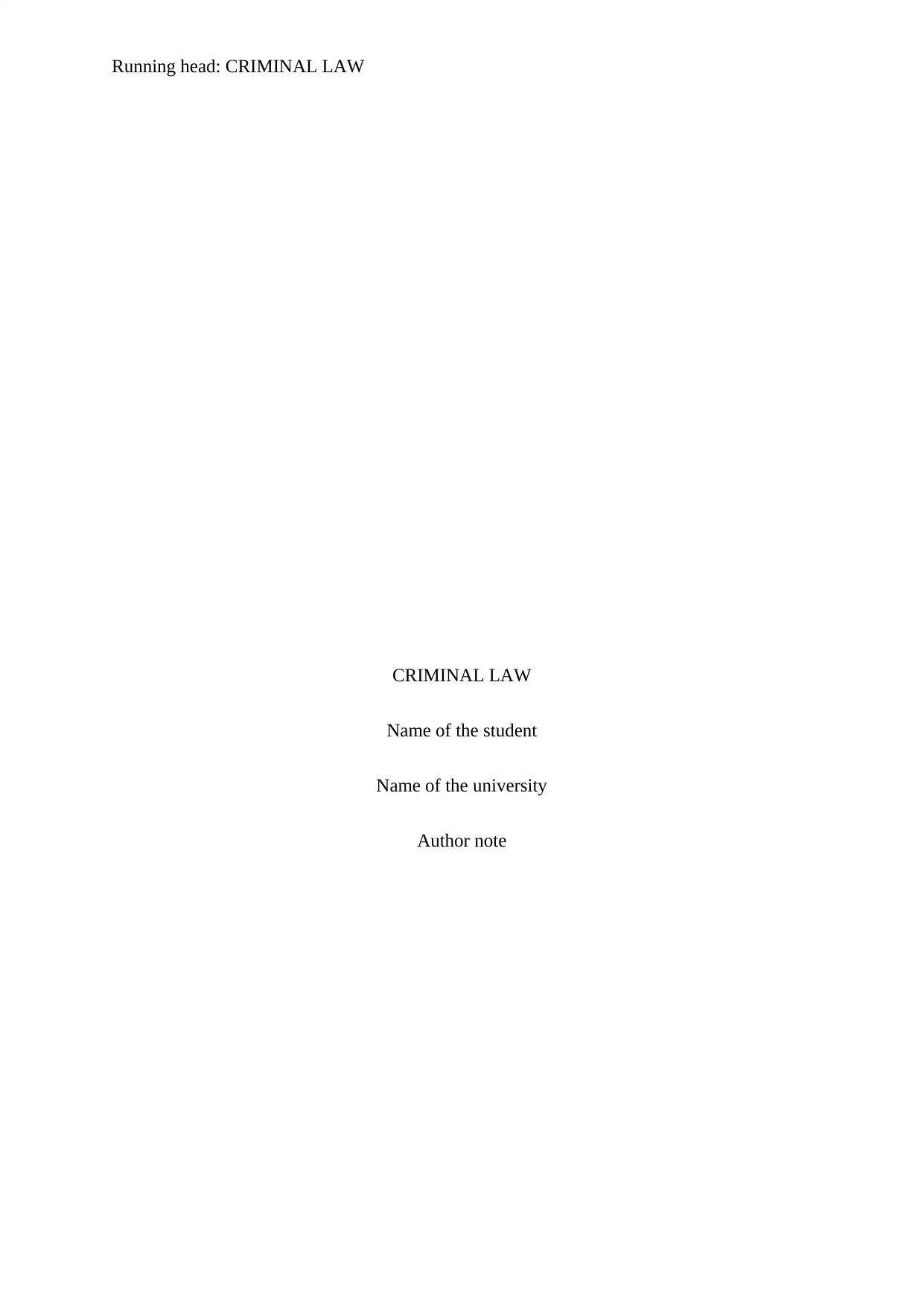
Running head: CRIMINAL LAW
CRIMINAL LAW
Name of the student
Name of the university
Author note
CRIMINAL LAW
Name of the student
Name of the university
Author note
Paraphrase This Document
Need a fresh take? Get an instant paraphrase of this document with our AI Paraphraser
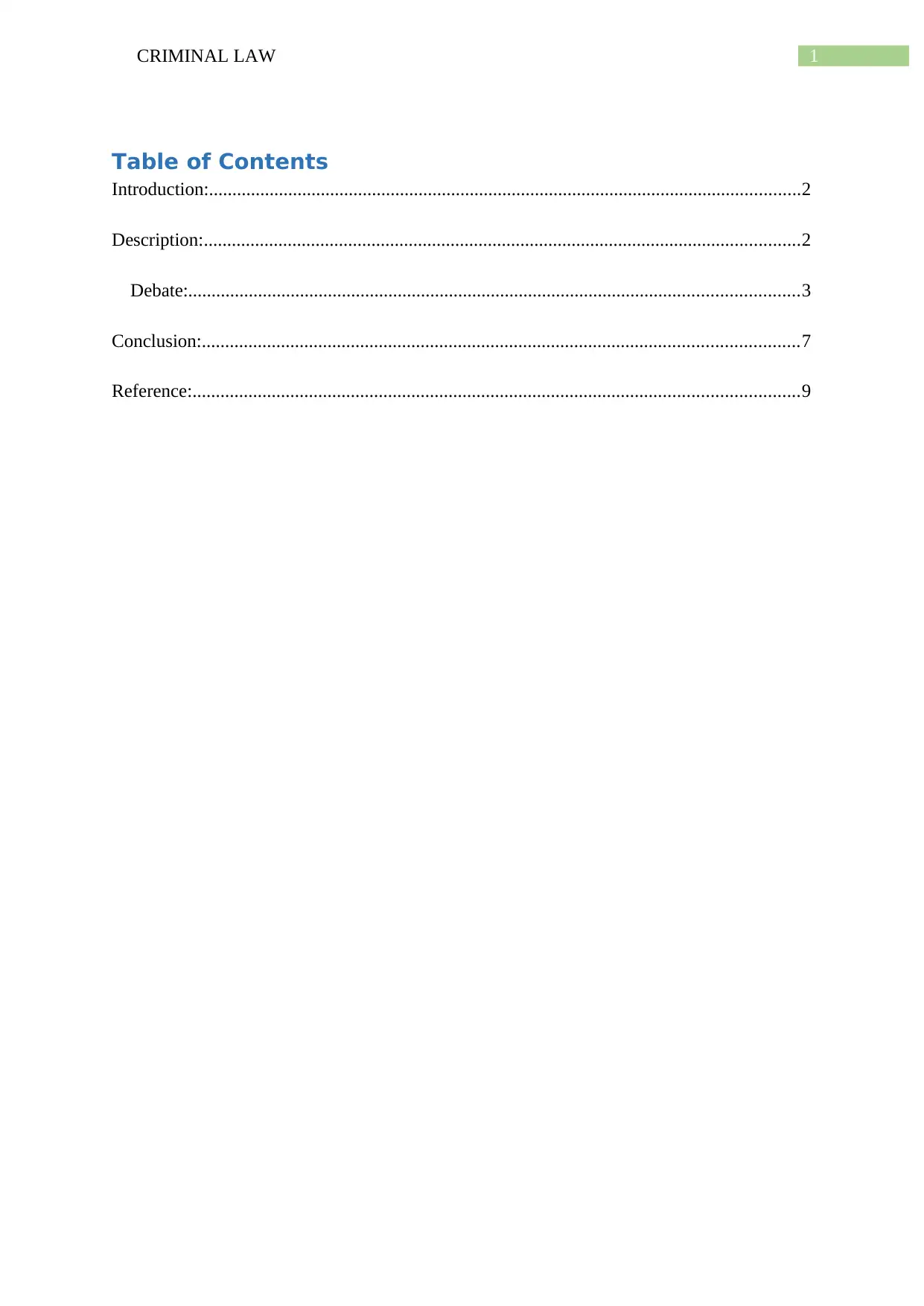
1CRIMINAL LAW
Table of Contents
Introduction:...............................................................................................................................2
Description:................................................................................................................................2
Debate:...................................................................................................................................3
Conclusion:................................................................................................................................7
Reference:..................................................................................................................................9
Table of Contents
Introduction:...............................................................................................................................2
Description:................................................................................................................................2
Debate:...................................................................................................................................3
Conclusion:................................................................................................................................7
Reference:..................................................................................................................................9
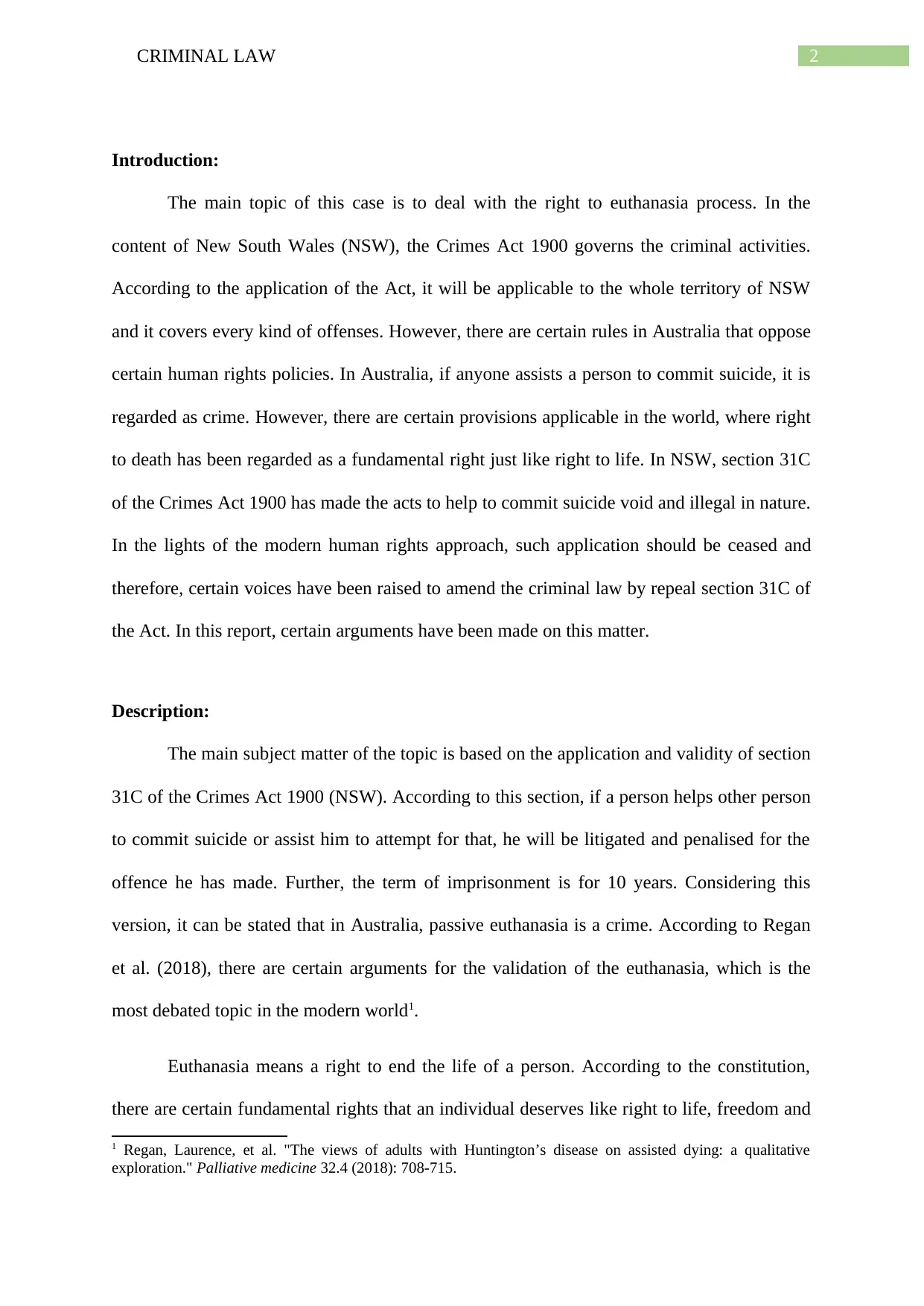
2CRIMINAL LAW
Introduction:
The main topic of this case is to deal with the right to euthanasia process. In the
content of New South Wales (NSW), the Crimes Act 1900 governs the criminal activities.
According to the application of the Act, it will be applicable to the whole territory of NSW
and it covers every kind of offenses. However, there are certain rules in Australia that oppose
certain human rights policies. In Australia, if anyone assists a person to commit suicide, it is
regarded as crime. However, there are certain provisions applicable in the world, where right
to death has been regarded as a fundamental right just like right to life. In NSW, section 31C
of the Crimes Act 1900 has made the acts to help to commit suicide void and illegal in nature.
In the lights of the modern human rights approach, such application should be ceased and
therefore, certain voices have been raised to amend the criminal law by repeal section 31C of
the Act. In this report, certain arguments have been made on this matter.
Description:
The main subject matter of the topic is based on the application and validity of section
31C of the Crimes Act 1900 (NSW). According to this section, if a person helps other person
to commit suicide or assist him to attempt for that, he will be litigated and penalised for the
offence he has made. Further, the term of imprisonment is for 10 years. Considering this
version, it can be stated that in Australia, passive euthanasia is a crime. According to Regan
et al. (2018), there are certain arguments for the validation of the euthanasia, which is the
most debated topic in the modern world1.
Euthanasia means a right to end the life of a person. According to the constitution,
there are certain fundamental rights that an individual deserves like right to life, freedom and
1 Regan, Laurence, et al. "The views of adults with Huntington’s disease on assisted dying: a qualitative
exploration." Palliative medicine 32.4 (2018): 708-715.
Introduction:
The main topic of this case is to deal with the right to euthanasia process. In the
content of New South Wales (NSW), the Crimes Act 1900 governs the criminal activities.
According to the application of the Act, it will be applicable to the whole territory of NSW
and it covers every kind of offenses. However, there are certain rules in Australia that oppose
certain human rights policies. In Australia, if anyone assists a person to commit suicide, it is
regarded as crime. However, there are certain provisions applicable in the world, where right
to death has been regarded as a fundamental right just like right to life. In NSW, section 31C
of the Crimes Act 1900 has made the acts to help to commit suicide void and illegal in nature.
In the lights of the modern human rights approach, such application should be ceased and
therefore, certain voices have been raised to amend the criminal law by repeal section 31C of
the Act. In this report, certain arguments have been made on this matter.
Description:
The main subject matter of the topic is based on the application and validity of section
31C of the Crimes Act 1900 (NSW). According to this section, if a person helps other person
to commit suicide or assist him to attempt for that, he will be litigated and penalised for the
offence he has made. Further, the term of imprisonment is for 10 years. Considering this
version, it can be stated that in Australia, passive euthanasia is a crime. According to Regan
et al. (2018), there are certain arguments for the validation of the euthanasia, which is the
most debated topic in the modern world1.
Euthanasia means a right to end the life of a person. According to the constitution,
there are certain fundamental rights that an individual deserves like right to life, freedom and
1 Regan, Laurence, et al. "The views of adults with Huntington’s disease on assisted dying: a qualitative
exploration." Palliative medicine 32.4 (2018): 708-715.
⊘ This is a preview!⊘
Do you want full access?
Subscribe today to unlock all pages.

Trusted by 1+ million students worldwide
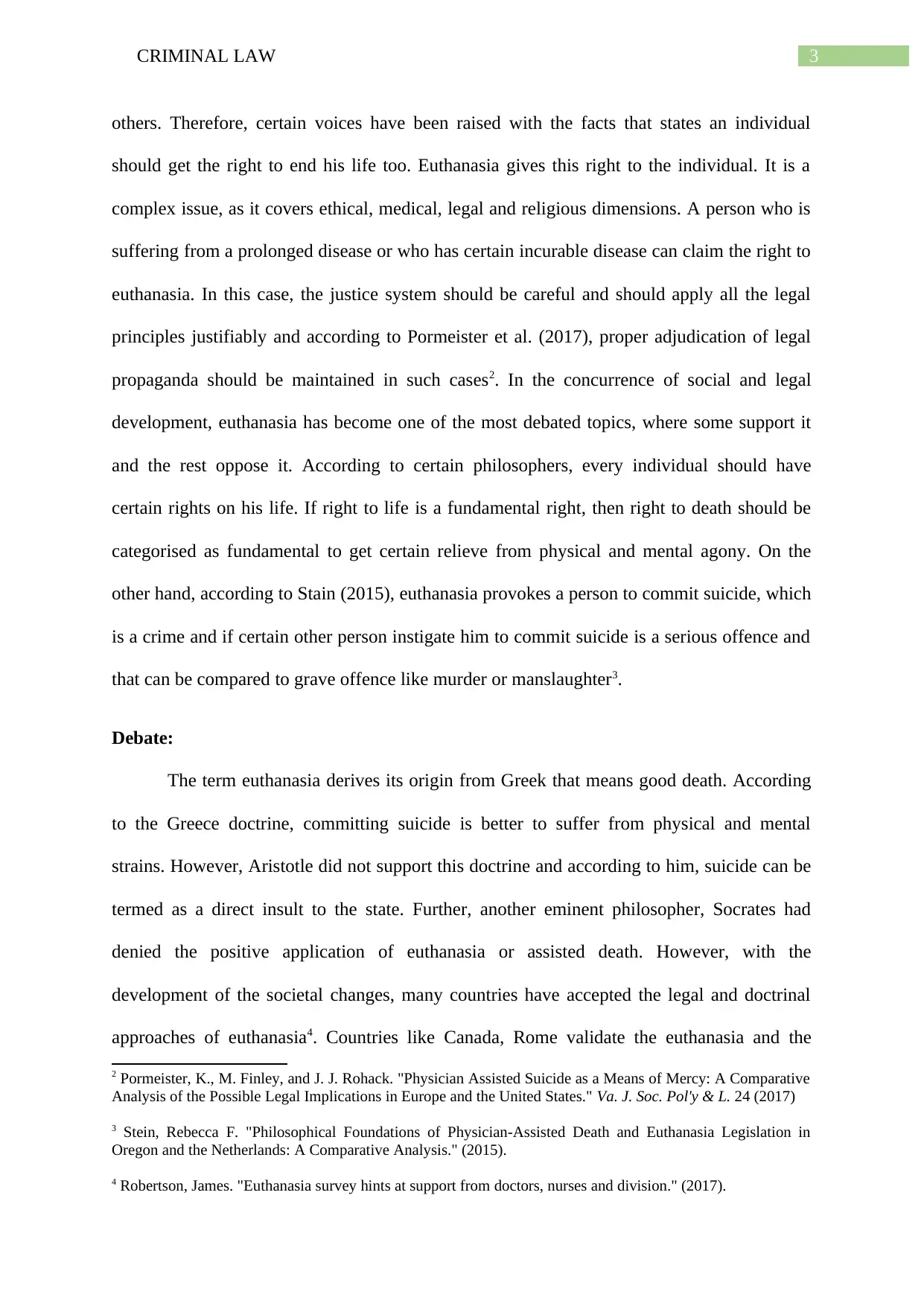
3CRIMINAL LAW
others. Therefore, certain voices have been raised with the facts that states an individual
should get the right to end his life too. Euthanasia gives this right to the individual. It is a
complex issue, as it covers ethical, medical, legal and religious dimensions. A person who is
suffering from a prolonged disease or who has certain incurable disease can claim the right to
euthanasia. In this case, the justice system should be careful and should apply all the legal
principles justifiably and according to Pormeister et al. (2017), proper adjudication of legal
propaganda should be maintained in such cases2. In the concurrence of social and legal
development, euthanasia has become one of the most debated topics, where some support it
and the rest oppose it. According to certain philosophers, every individual should have
certain rights on his life. If right to life is a fundamental right, then right to death should be
categorised as fundamental to get certain relieve from physical and mental agony. On the
other hand, according to Stain (2015), euthanasia provokes a person to commit suicide, which
is a crime and if certain other person instigate him to commit suicide is a serious offence and
that can be compared to grave offence like murder or manslaughter3.
Debate:
The term euthanasia derives its origin from Greek that means good death. According
to the Greece doctrine, committing suicide is better to suffer from physical and mental
strains. However, Aristotle did not support this doctrine and according to him, suicide can be
termed as a direct insult to the state. Further, another eminent philosopher, Socrates had
denied the positive application of euthanasia or assisted death. However, with the
development of the societal changes, many countries have accepted the legal and doctrinal
approaches of euthanasia4. Countries like Canada, Rome validate the euthanasia and the
2 Pormeister, K., M. Finley, and J. J. Rohack. "Physician Assisted Suicide as a Means of Mercy: A Comparative
Analysis of the Possible Legal Implications in Europe and the United States." Va. J. Soc. Pol'y & L. 24 (2017)
3 Stein, Rebecca F. "Philosophical Foundations of Physician-Assisted Death and Euthanasia Legislation in
Oregon and the Netherlands: A Comparative Analysis." (2015).
4 Robertson, James. "Euthanasia survey hints at support from doctors, nurses and division." (2017).
others. Therefore, certain voices have been raised with the facts that states an individual
should get the right to end his life too. Euthanasia gives this right to the individual. It is a
complex issue, as it covers ethical, medical, legal and religious dimensions. A person who is
suffering from a prolonged disease or who has certain incurable disease can claim the right to
euthanasia. In this case, the justice system should be careful and should apply all the legal
principles justifiably and according to Pormeister et al. (2017), proper adjudication of legal
propaganda should be maintained in such cases2. In the concurrence of social and legal
development, euthanasia has become one of the most debated topics, where some support it
and the rest oppose it. According to certain philosophers, every individual should have
certain rights on his life. If right to life is a fundamental right, then right to death should be
categorised as fundamental to get certain relieve from physical and mental agony. On the
other hand, according to Stain (2015), euthanasia provokes a person to commit suicide, which
is a crime and if certain other person instigate him to commit suicide is a serious offence and
that can be compared to grave offence like murder or manslaughter3.
Debate:
The term euthanasia derives its origin from Greek that means good death. According
to the Greece doctrine, committing suicide is better to suffer from physical and mental
strains. However, Aristotle did not support this doctrine and according to him, suicide can be
termed as a direct insult to the state. Further, another eminent philosopher, Socrates had
denied the positive application of euthanasia or assisted death. However, with the
development of the societal changes, many countries have accepted the legal and doctrinal
approaches of euthanasia4. Countries like Canada, Rome validate the euthanasia and the
2 Pormeister, K., M. Finley, and J. J. Rohack. "Physician Assisted Suicide as a Means of Mercy: A Comparative
Analysis of the Possible Legal Implications in Europe and the United States." Va. J. Soc. Pol'y & L. 24 (2017)
3 Stein, Rebecca F. "Philosophical Foundations of Physician-Assisted Death and Euthanasia Legislation in
Oregon and the Netherlands: A Comparative Analysis." (2015).
4 Robertson, James. "Euthanasia survey hints at support from doctors, nurses and division." (2017).
Paraphrase This Document
Need a fresh take? Get an instant paraphrase of this document with our AI Paraphraser
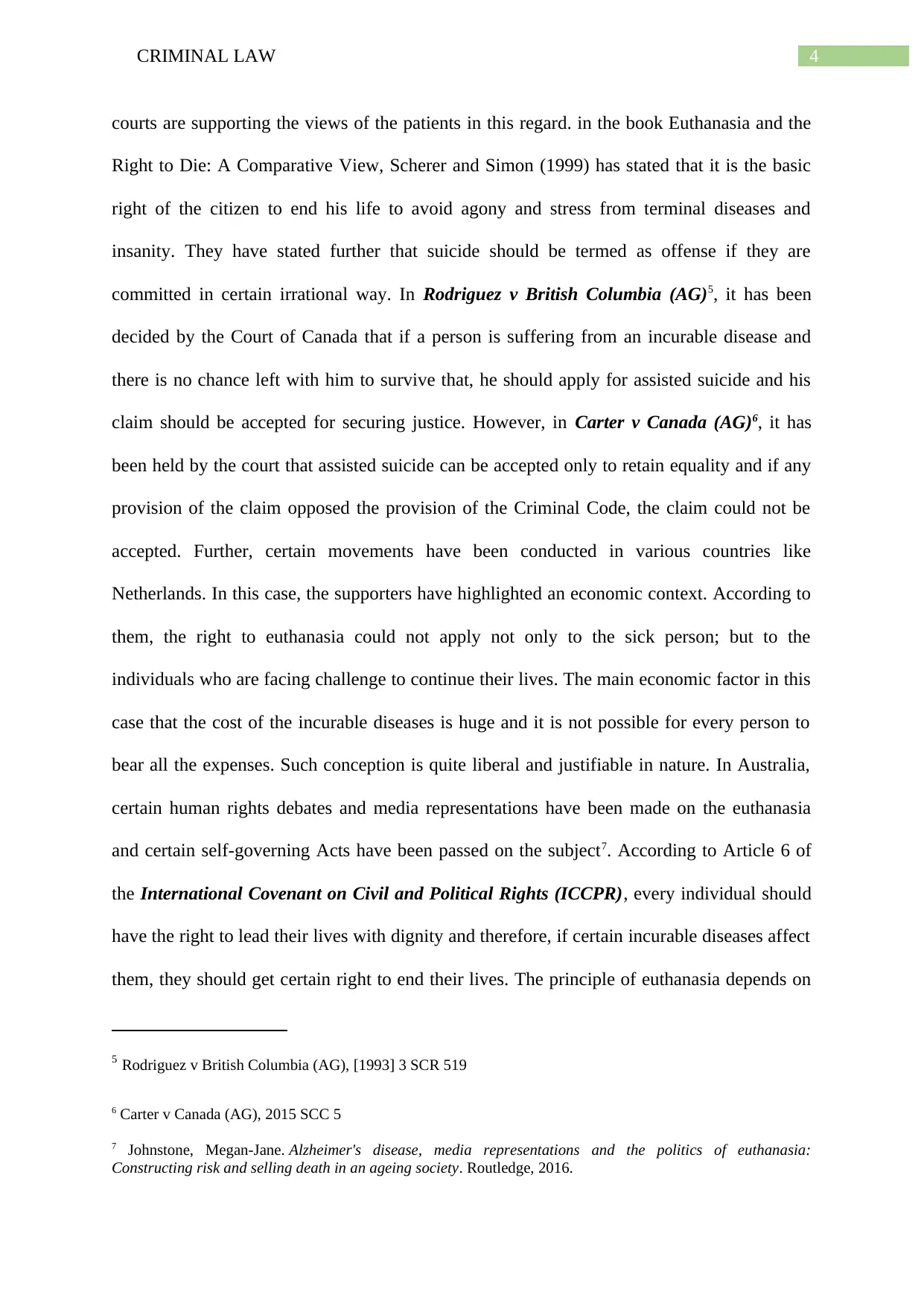
4CRIMINAL LAW
courts are supporting the views of the patients in this regard. in the book Euthanasia and the
Right to Die: A Comparative View, Scherer and Simon (1999) has stated that it is the basic
right of the citizen to end his life to avoid agony and stress from terminal diseases and
insanity. They have stated further that suicide should be termed as offense if they are
committed in certain irrational way. In Rodriguez v British Columbia (AG)5, it has been
decided by the Court of Canada that if a person is suffering from an incurable disease and
there is no chance left with him to survive that, he should apply for assisted suicide and his
claim should be accepted for securing justice. However, in Carter v Canada (AG)6, it has
been held by the court that assisted suicide can be accepted only to retain equality and if any
provision of the claim opposed the provision of the Criminal Code, the claim could not be
accepted. Further, certain movements have been conducted in various countries like
Netherlands. In this case, the supporters have highlighted an economic context. According to
them, the right to euthanasia could not apply not only to the sick person; but to the
individuals who are facing challenge to continue their lives. The main economic factor in this
case that the cost of the incurable diseases is huge and it is not possible for every person to
bear all the expenses. Such conception is quite liberal and justifiable in nature. In Australia,
certain human rights debates and media representations have been made on the euthanasia
and certain self-governing Acts have been passed on the subject7. According to Article 6 of
the International Covenant on Civil and Political Rights (ICCPR), every individual should
have the right to lead their lives with dignity and therefore, if certain incurable diseases affect
them, they should get certain right to end their lives. The principle of euthanasia depends on
5 Rodriguez v British Columbia (AG), [1993] 3 SCR 519
6 Carter v Canada (AG), 2015 SCC 5
7 Johnstone, Megan-Jane. Alzheimer's disease, media representations and the politics of euthanasia:
Constructing risk and selling death in an ageing society. Routledge, 2016.
courts are supporting the views of the patients in this regard. in the book Euthanasia and the
Right to Die: A Comparative View, Scherer and Simon (1999) has stated that it is the basic
right of the citizen to end his life to avoid agony and stress from terminal diseases and
insanity. They have stated further that suicide should be termed as offense if they are
committed in certain irrational way. In Rodriguez v British Columbia (AG)5, it has been
decided by the Court of Canada that if a person is suffering from an incurable disease and
there is no chance left with him to survive that, he should apply for assisted suicide and his
claim should be accepted for securing justice. However, in Carter v Canada (AG)6, it has
been held by the court that assisted suicide can be accepted only to retain equality and if any
provision of the claim opposed the provision of the Criminal Code, the claim could not be
accepted. Further, certain movements have been conducted in various countries like
Netherlands. In this case, the supporters have highlighted an economic context. According to
them, the right to euthanasia could not apply not only to the sick person; but to the
individuals who are facing challenge to continue their lives. The main economic factor in this
case that the cost of the incurable diseases is huge and it is not possible for every person to
bear all the expenses. Such conception is quite liberal and justifiable in nature. In Australia,
certain human rights debates and media representations have been made on the euthanasia
and certain self-governing Acts have been passed on the subject7. According to Article 6 of
the International Covenant on Civil and Political Rights (ICCPR), every individual should
have the right to lead their lives with dignity and therefore, if certain incurable diseases affect
them, they should get certain right to end their lives. The principle of euthanasia depends on
5 Rodriguez v British Columbia (AG), [1993] 3 SCR 519
6 Carter v Canada (AG), 2015 SCC 5
7 Johnstone, Megan-Jane. Alzheimer's disease, media representations and the politics of euthanasia:
Constructing risk and selling death in an ageing society. Routledge, 2016.
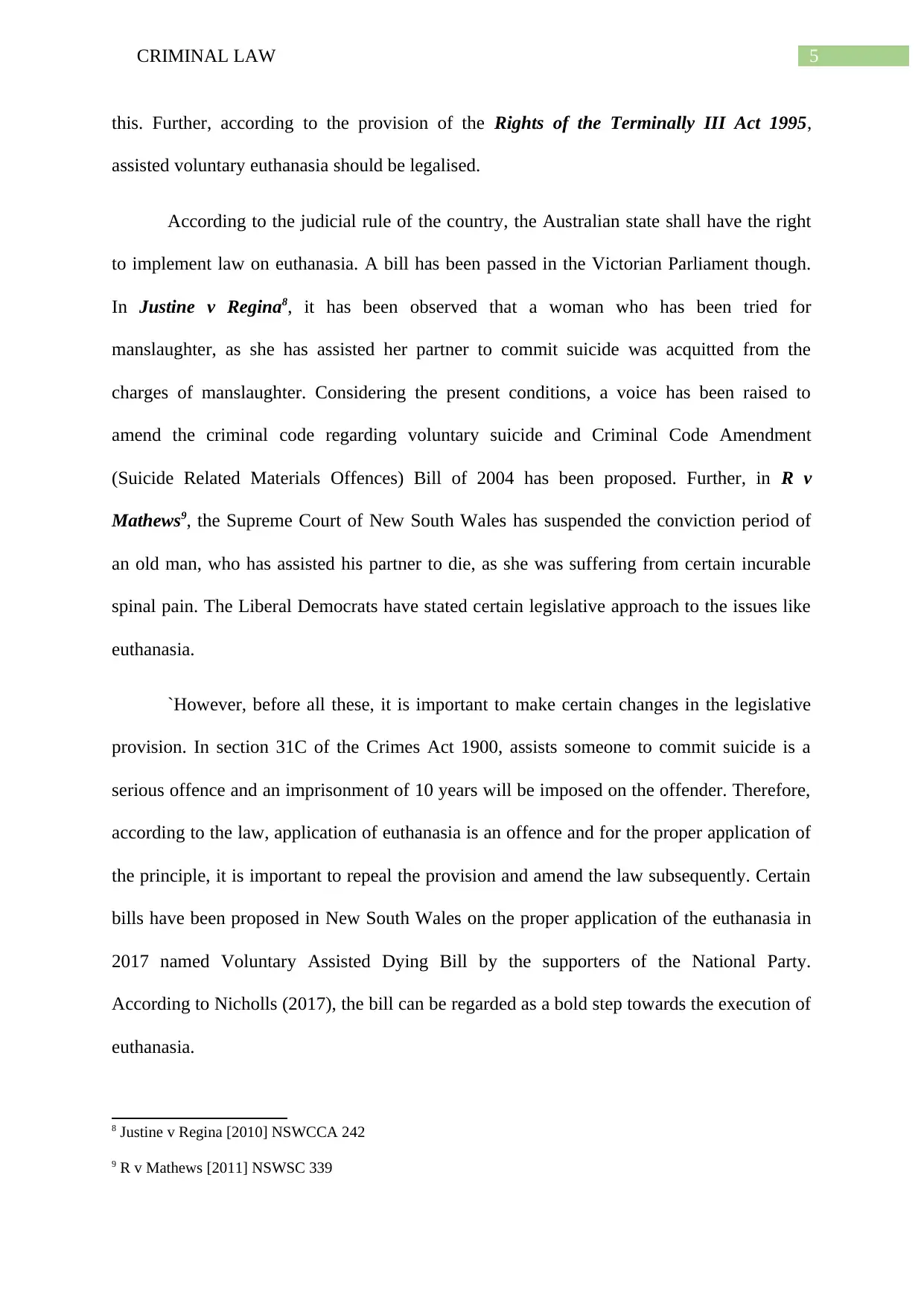
5CRIMINAL LAW
this. Further, according to the provision of the Rights of the Terminally III Act 1995,
assisted voluntary euthanasia should be legalised.
According to the judicial rule of the country, the Australian state shall have the right
to implement law on euthanasia. A bill has been passed in the Victorian Parliament though.
In Justine v Regina8, it has been observed that a woman who has been tried for
manslaughter, as she has assisted her partner to commit suicide was acquitted from the
charges of manslaughter. Considering the present conditions, a voice has been raised to
amend the criminal code regarding voluntary suicide and Criminal Code Amendment
(Suicide Related Materials Offences) Bill of 2004 has been proposed. Further, in R v
Mathews9, the Supreme Court of New South Wales has suspended the conviction period of
an old man, who has assisted his partner to die, as she was suffering from certain incurable
spinal pain. The Liberal Democrats have stated certain legislative approach to the issues like
euthanasia.
`However, before all these, it is important to make certain changes in the legislative
provision. In section 31C of the Crimes Act 1900, assists someone to commit suicide is a
serious offence and an imprisonment of 10 years will be imposed on the offender. Therefore,
according to the law, application of euthanasia is an offence and for the proper application of
the principle, it is important to repeal the provision and amend the law subsequently. Certain
bills have been proposed in New South Wales on the proper application of the euthanasia in
2017 named Voluntary Assisted Dying Bill by the supporters of the National Party.
According to Nicholls (2017), the bill can be regarded as a bold step towards the execution of
euthanasia.
8 Justine v Regina [2010] NSWCCA 242
9 R v Mathews [2011] NSWSC 339
this. Further, according to the provision of the Rights of the Terminally III Act 1995,
assisted voluntary euthanasia should be legalised.
According to the judicial rule of the country, the Australian state shall have the right
to implement law on euthanasia. A bill has been passed in the Victorian Parliament though.
In Justine v Regina8, it has been observed that a woman who has been tried for
manslaughter, as she has assisted her partner to commit suicide was acquitted from the
charges of manslaughter. Considering the present conditions, a voice has been raised to
amend the criminal code regarding voluntary suicide and Criminal Code Amendment
(Suicide Related Materials Offences) Bill of 2004 has been proposed. Further, in R v
Mathews9, the Supreme Court of New South Wales has suspended the conviction period of
an old man, who has assisted his partner to die, as she was suffering from certain incurable
spinal pain. The Liberal Democrats have stated certain legislative approach to the issues like
euthanasia.
`However, before all these, it is important to make certain changes in the legislative
provision. In section 31C of the Crimes Act 1900, assists someone to commit suicide is a
serious offence and an imprisonment of 10 years will be imposed on the offender. Therefore,
according to the law, application of euthanasia is an offence and for the proper application of
the principle, it is important to repeal the provision and amend the law subsequently. Certain
bills have been proposed in New South Wales on the proper application of the euthanasia in
2017 named Voluntary Assisted Dying Bill by the supporters of the National Party.
According to Nicholls (2017), the bill can be regarded as a bold step towards the execution of
euthanasia.
8 Justine v Regina [2010] NSWCCA 242
9 R v Mathews [2011] NSWSC 339
⊘ This is a preview!⊘
Do you want full access?
Subscribe today to unlock all pages.

Trusted by 1+ million students worldwide
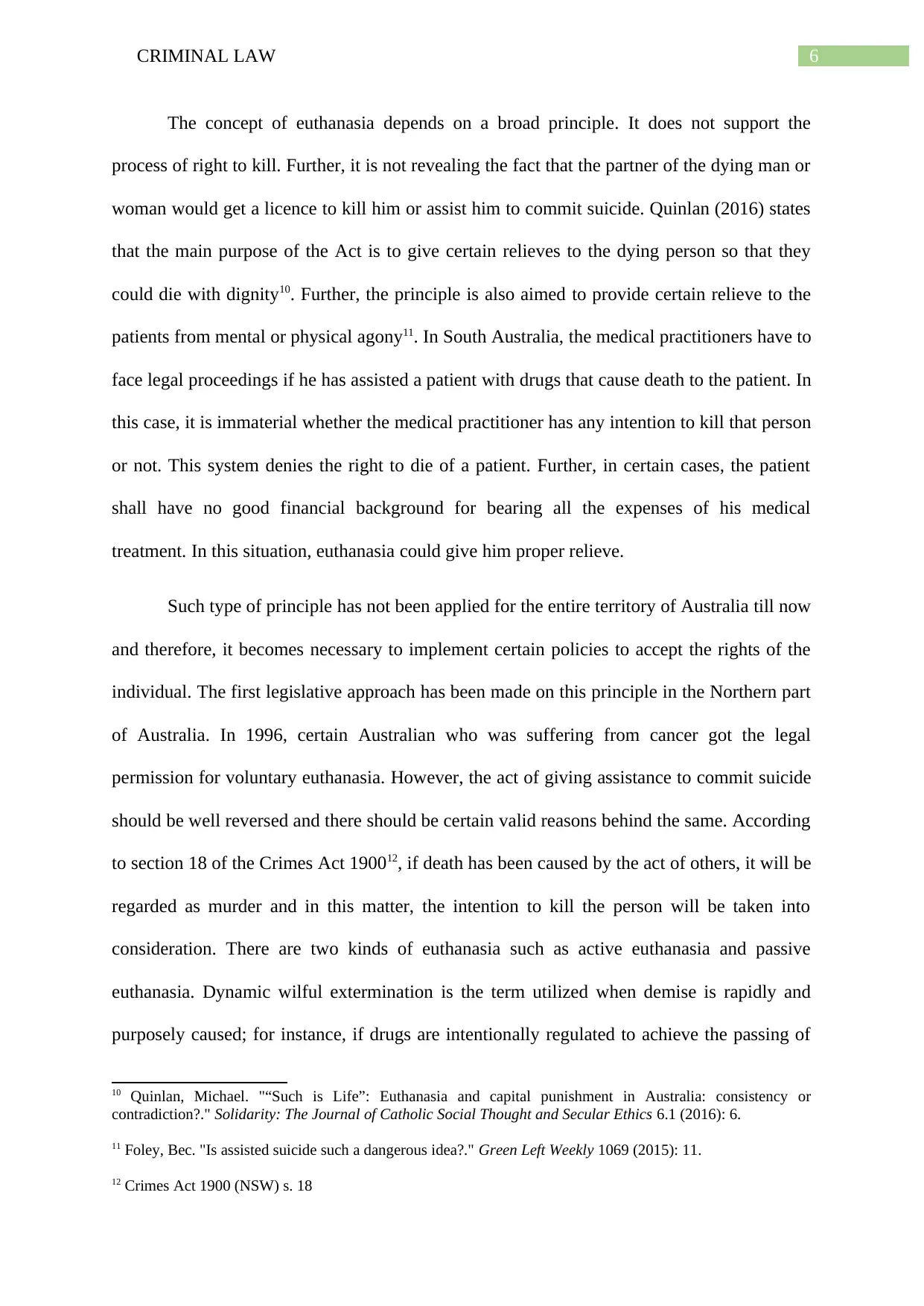
6CRIMINAL LAW
The concept of euthanasia depends on a broad principle. It does not support the
process of right to kill. Further, it is not revealing the fact that the partner of the dying man or
woman would get a licence to kill him or assist him to commit suicide. Quinlan (2016) states
that the main purpose of the Act is to give certain relieves to the dying person so that they
could die with dignity10. Further, the principle is also aimed to provide certain relieve to the
patients from mental or physical agony11. In South Australia, the medical practitioners have to
face legal proceedings if he has assisted a patient with drugs that cause death to the patient. In
this case, it is immaterial whether the medical practitioner has any intention to kill that person
or not. This system denies the right to die of a patient. Further, in certain cases, the patient
shall have no good financial background for bearing all the expenses of his medical
treatment. In this situation, euthanasia could give him proper relieve.
Such type of principle has not been applied for the entire territory of Australia till now
and therefore, it becomes necessary to implement certain policies to accept the rights of the
individual. The first legislative approach has been made on this principle in the Northern part
of Australia. In 1996, certain Australian who was suffering from cancer got the legal
permission for voluntary euthanasia. However, the act of giving assistance to commit suicide
should be well reversed and there should be certain valid reasons behind the same. According
to section 18 of the Crimes Act 190012, if death has been caused by the act of others, it will be
regarded as murder and in this matter, the intention to kill the person will be taken into
consideration. There are two kinds of euthanasia such as active euthanasia and passive
euthanasia. Dynamic wilful extermination is the term utilized when demise is rapidly and
purposely caused; for instance, if drugs are intentionally regulated to achieve the passing of
10 Quinlan, Michael. "“Such is Life”: Euthanasia and capital punishment in Australia: consistency or
contradiction?." Solidarity: The Journal of Catholic Social Thought and Secular Ethics 6.1 (2016): 6.
11 Foley, Bec. "Is assisted suicide such a dangerous idea?." Green Left Weekly 1069 (2015): 11.
12 Crimes Act 1900 (NSW) s. 18
The concept of euthanasia depends on a broad principle. It does not support the
process of right to kill. Further, it is not revealing the fact that the partner of the dying man or
woman would get a licence to kill him or assist him to commit suicide. Quinlan (2016) states
that the main purpose of the Act is to give certain relieves to the dying person so that they
could die with dignity10. Further, the principle is also aimed to provide certain relieve to the
patients from mental or physical agony11. In South Australia, the medical practitioners have to
face legal proceedings if he has assisted a patient with drugs that cause death to the patient. In
this case, it is immaterial whether the medical practitioner has any intention to kill that person
or not. This system denies the right to die of a patient. Further, in certain cases, the patient
shall have no good financial background for bearing all the expenses of his medical
treatment. In this situation, euthanasia could give him proper relieve.
Such type of principle has not been applied for the entire territory of Australia till now
and therefore, it becomes necessary to implement certain policies to accept the rights of the
individual. The first legislative approach has been made on this principle in the Northern part
of Australia. In 1996, certain Australian who was suffering from cancer got the legal
permission for voluntary euthanasia. However, the act of giving assistance to commit suicide
should be well reversed and there should be certain valid reasons behind the same. According
to section 18 of the Crimes Act 190012, if death has been caused by the act of others, it will be
regarded as murder and in this matter, the intention to kill the person will be taken into
consideration. There are two kinds of euthanasia such as active euthanasia and passive
euthanasia. Dynamic wilful extermination is the term utilized when demise is rapidly and
purposely caused; for instance, if drugs are intentionally regulated to achieve the passing of
10 Quinlan, Michael. "“Such is Life”: Euthanasia and capital punishment in Australia: consistency or
contradiction?." Solidarity: The Journal of Catholic Social Thought and Secular Ethics 6.1 (2016): 6.
11 Foley, Bec. "Is assisted suicide such a dangerous idea?." Green Left Weekly 1069 (2015): 11.
12 Crimes Act 1900 (NSW) s. 18
Paraphrase This Document
Need a fresh take? Get an instant paraphrase of this document with our AI Paraphraser
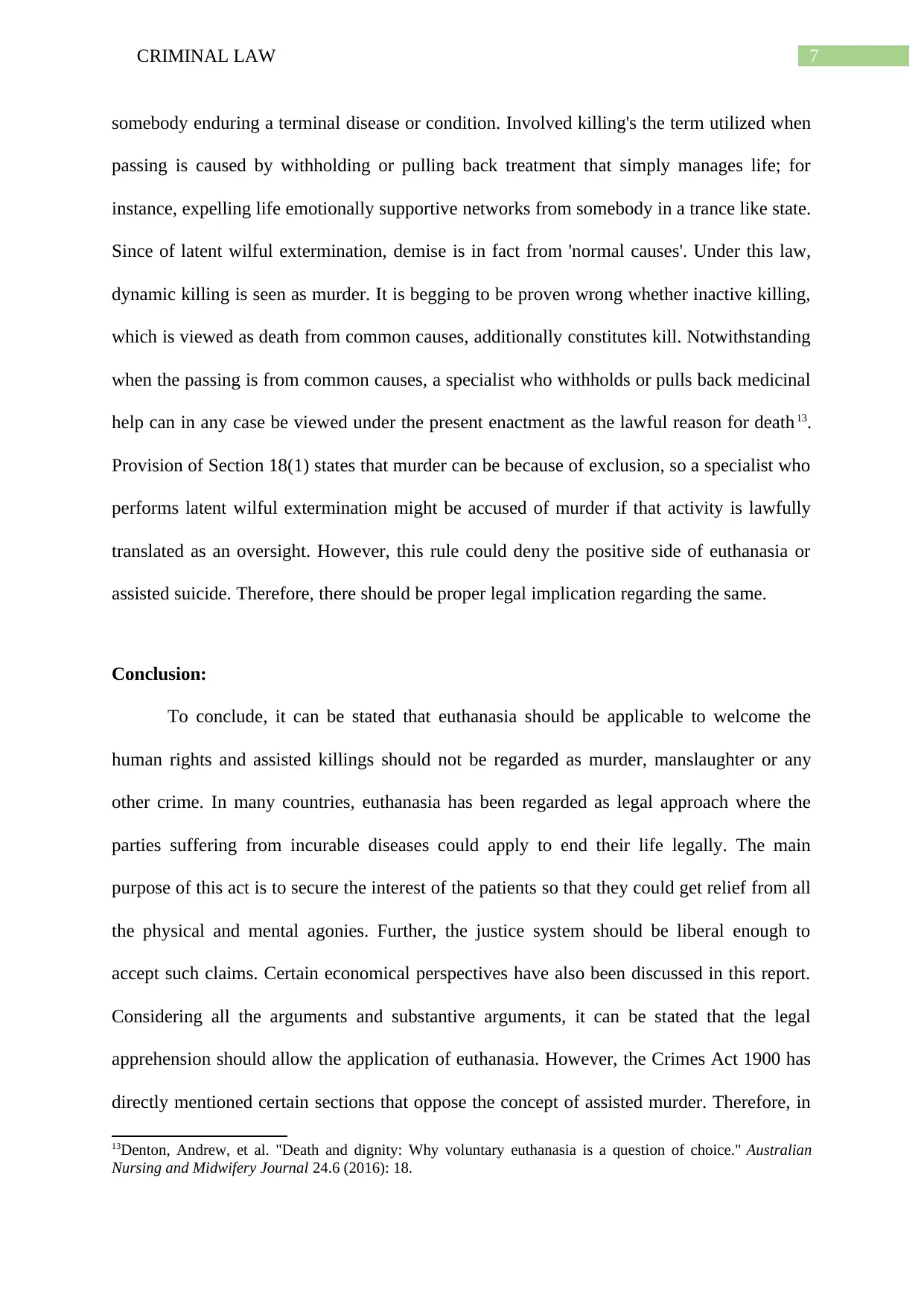
7CRIMINAL LAW
somebody enduring a terminal disease or condition. Involved killing's the term utilized when
passing is caused by withholding or pulling back treatment that simply manages life; for
instance, expelling life emotionally supportive networks from somebody in a trance like state.
Since of latent wilful extermination, demise is in fact from 'normal causes'. Under this law,
dynamic killing is seen as murder. It is begging to be proven wrong whether inactive killing,
which is viewed as death from common causes, additionally constitutes kill. Notwithstanding
when the passing is from common causes, a specialist who withholds or pulls back medicinal
help can in any case be viewed under the present enactment as the lawful reason for death13.
Provision of Section 18(1) states that murder can be because of exclusion, so a specialist who
performs latent wilful extermination might be accused of murder if that activity is lawfully
translated as an oversight. However, this rule could deny the positive side of euthanasia or
assisted suicide. Therefore, there should be proper legal implication regarding the same.
Conclusion:
To conclude, it can be stated that euthanasia should be applicable to welcome the
human rights and assisted killings should not be regarded as murder, manslaughter or any
other crime. In many countries, euthanasia has been regarded as legal approach where the
parties suffering from incurable diseases could apply to end their life legally. The main
purpose of this act is to secure the interest of the patients so that they could get relief from all
the physical and mental agonies. Further, the justice system should be liberal enough to
accept such claims. Certain economical perspectives have also been discussed in this report.
Considering all the arguments and substantive arguments, it can be stated that the legal
apprehension should allow the application of euthanasia. However, the Crimes Act 1900 has
directly mentioned certain sections that oppose the concept of assisted murder. Therefore, in
13Denton, Andrew, et al. "Death and dignity: Why voluntary euthanasia is a question of choice." Australian
Nursing and Midwifery Journal 24.6 (2016): 18.
somebody enduring a terminal disease or condition. Involved killing's the term utilized when
passing is caused by withholding or pulling back treatment that simply manages life; for
instance, expelling life emotionally supportive networks from somebody in a trance like state.
Since of latent wilful extermination, demise is in fact from 'normal causes'. Under this law,
dynamic killing is seen as murder. It is begging to be proven wrong whether inactive killing,
which is viewed as death from common causes, additionally constitutes kill. Notwithstanding
when the passing is from common causes, a specialist who withholds or pulls back medicinal
help can in any case be viewed under the present enactment as the lawful reason for death13.
Provision of Section 18(1) states that murder can be because of exclusion, so a specialist who
performs latent wilful extermination might be accused of murder if that activity is lawfully
translated as an oversight. However, this rule could deny the positive side of euthanasia or
assisted suicide. Therefore, there should be proper legal implication regarding the same.
Conclusion:
To conclude, it can be stated that euthanasia should be applicable to welcome the
human rights and assisted killings should not be regarded as murder, manslaughter or any
other crime. In many countries, euthanasia has been regarded as legal approach where the
parties suffering from incurable diseases could apply to end their life legally. The main
purpose of this act is to secure the interest of the patients so that they could get relief from all
the physical and mental agonies. Further, the justice system should be liberal enough to
accept such claims. Certain economical perspectives have also been discussed in this report.
Considering all the arguments and substantive arguments, it can be stated that the legal
apprehension should allow the application of euthanasia. However, the Crimes Act 1900 has
directly mentioned certain sections that oppose the concept of assisted murder. Therefore, in
13Denton, Andrew, et al. "Death and dignity: Why voluntary euthanasia is a question of choice." Australian
Nursing and Midwifery Journal 24.6 (2016): 18.
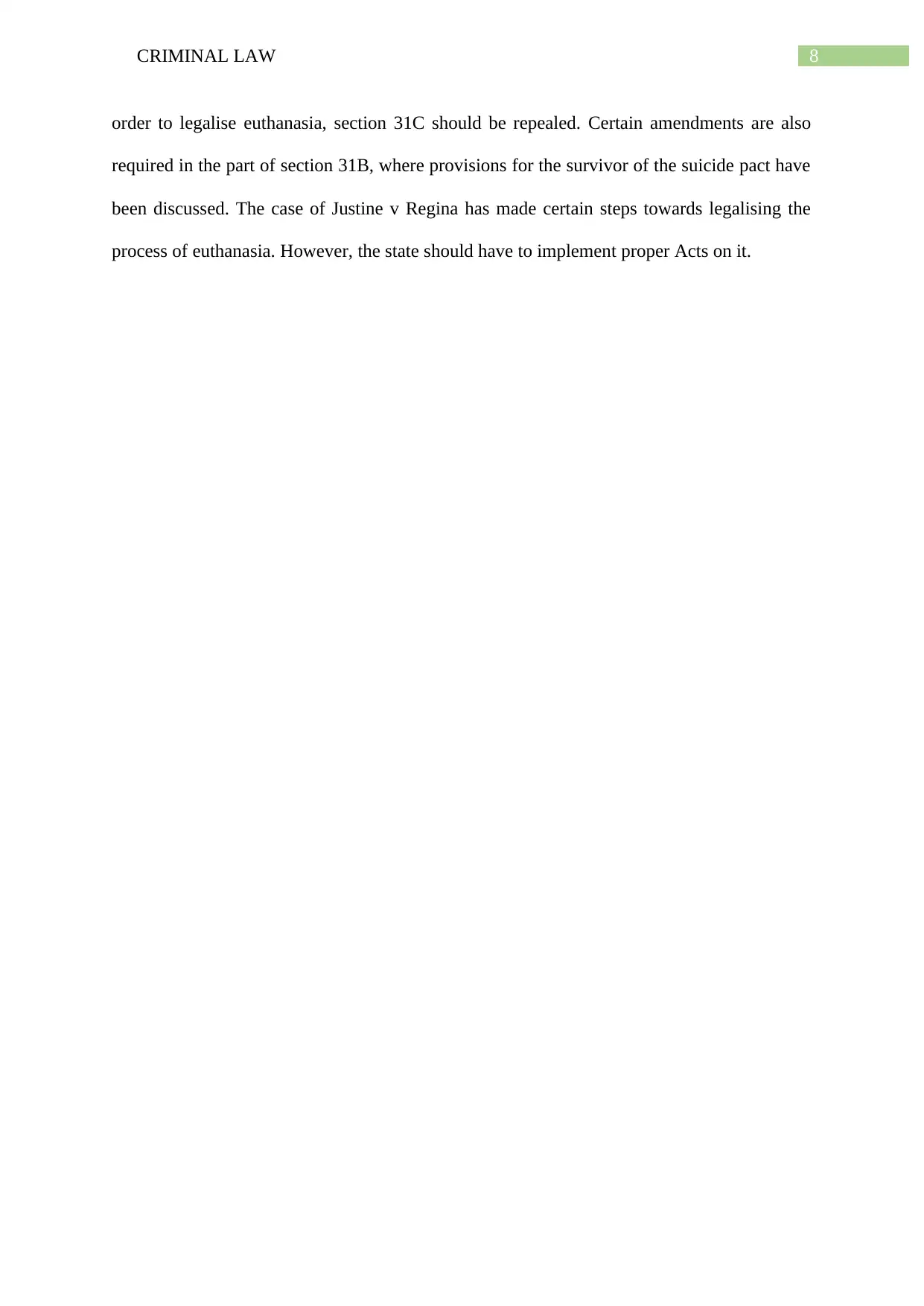
8CRIMINAL LAW
order to legalise euthanasia, section 31C should be repealed. Certain amendments are also
required in the part of section 31B, where provisions for the survivor of the suicide pact have
been discussed. The case of Justine v Regina has made certain steps towards legalising the
process of euthanasia. However, the state should have to implement proper Acts on it.
order to legalise euthanasia, section 31C should be repealed. Certain amendments are also
required in the part of section 31B, where provisions for the survivor of the suicide pact have
been discussed. The case of Justine v Regina has made certain steps towards legalising the
process of euthanasia. However, the state should have to implement proper Acts on it.
⊘ This is a preview!⊘
Do you want full access?
Subscribe today to unlock all pages.

Trusted by 1+ million students worldwide
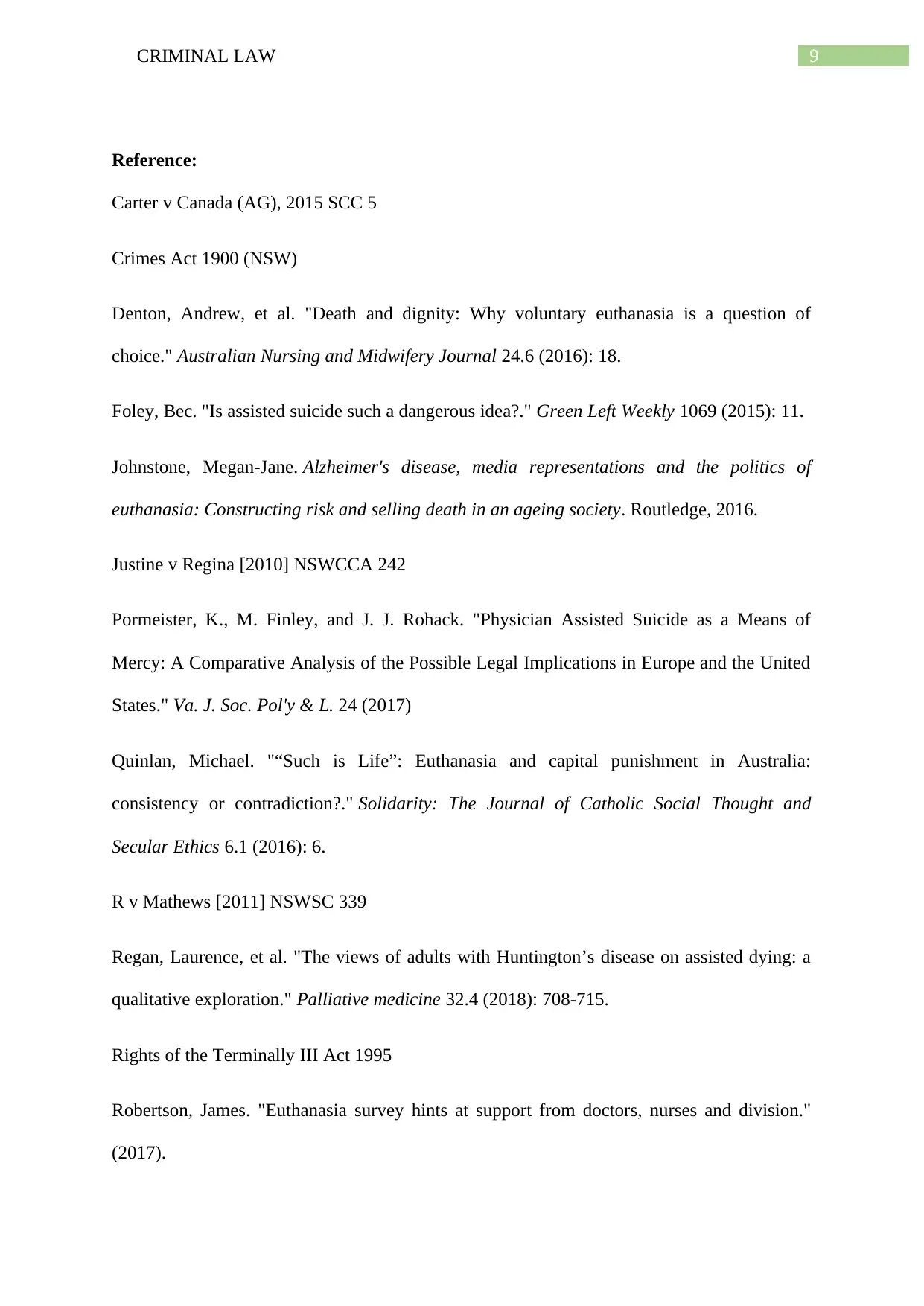
9CRIMINAL LAW
Reference:
Carter v Canada (AG), 2015 SCC 5
Crimes Act 1900 (NSW)
Denton, Andrew, et al. "Death and dignity: Why voluntary euthanasia is a question of
choice." Australian Nursing and Midwifery Journal 24.6 (2016): 18.
Foley, Bec. "Is assisted suicide such a dangerous idea?." Green Left Weekly 1069 (2015): 11.
Johnstone, Megan-Jane. Alzheimer's disease, media representations and the politics of
euthanasia: Constructing risk and selling death in an ageing society. Routledge, 2016.
Justine v Regina [2010] NSWCCA 242
Pormeister, K., M. Finley, and J. J. Rohack. "Physician Assisted Suicide as a Means of
Mercy: A Comparative Analysis of the Possible Legal Implications in Europe and the United
States." Va. J. Soc. Pol'y & L. 24 (2017)
Quinlan, Michael. "“Such is Life”: Euthanasia and capital punishment in Australia:
consistency or contradiction?." Solidarity: The Journal of Catholic Social Thought and
Secular Ethics 6.1 (2016): 6.
R v Mathews [2011] NSWSC 339
Regan, Laurence, et al. "The views of adults with Huntington’s disease on assisted dying: a
qualitative exploration." Palliative medicine 32.4 (2018): 708-715.
Rights of the Terminally III Act 1995
Robertson, James. "Euthanasia survey hints at support from doctors, nurses and division."
(2017).
Reference:
Carter v Canada (AG), 2015 SCC 5
Crimes Act 1900 (NSW)
Denton, Andrew, et al. "Death and dignity: Why voluntary euthanasia is a question of
choice." Australian Nursing and Midwifery Journal 24.6 (2016): 18.
Foley, Bec. "Is assisted suicide such a dangerous idea?." Green Left Weekly 1069 (2015): 11.
Johnstone, Megan-Jane. Alzheimer's disease, media representations and the politics of
euthanasia: Constructing risk and selling death in an ageing society. Routledge, 2016.
Justine v Regina [2010] NSWCCA 242
Pormeister, K., M. Finley, and J. J. Rohack. "Physician Assisted Suicide as a Means of
Mercy: A Comparative Analysis of the Possible Legal Implications in Europe and the United
States." Va. J. Soc. Pol'y & L. 24 (2017)
Quinlan, Michael. "“Such is Life”: Euthanasia and capital punishment in Australia:
consistency or contradiction?." Solidarity: The Journal of Catholic Social Thought and
Secular Ethics 6.1 (2016): 6.
R v Mathews [2011] NSWSC 339
Regan, Laurence, et al. "The views of adults with Huntington’s disease on assisted dying: a
qualitative exploration." Palliative medicine 32.4 (2018): 708-715.
Rights of the Terminally III Act 1995
Robertson, James. "Euthanasia survey hints at support from doctors, nurses and division."
(2017).
Paraphrase This Document
Need a fresh take? Get an instant paraphrase of this document with our AI Paraphraser
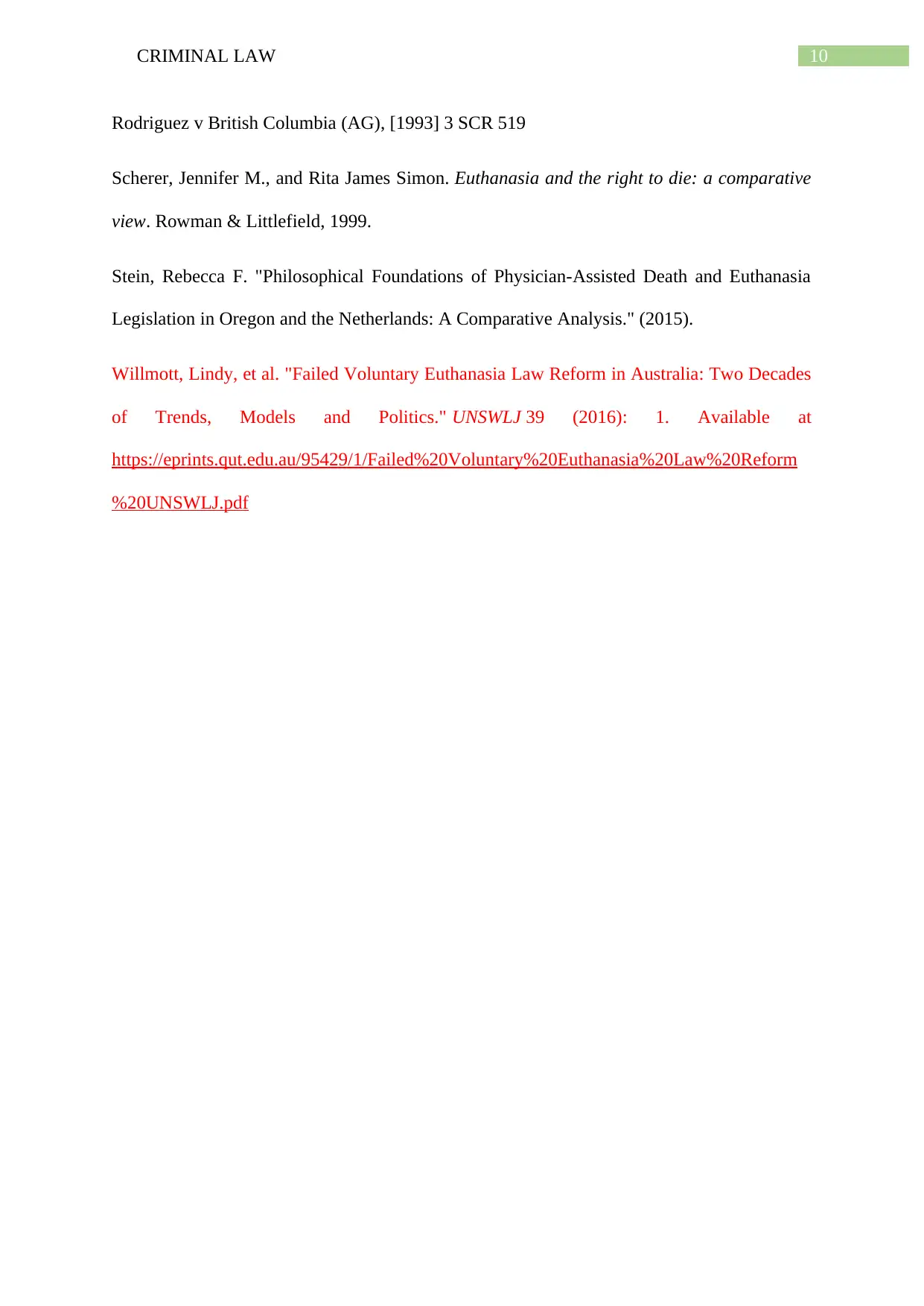
10CRIMINAL LAW
Rodriguez v British Columbia (AG), [1993] 3 SCR 519
Scherer, Jennifer M., and Rita James Simon. Euthanasia and the right to die: a comparative
view. Rowman & Littlefield, 1999.
Stein, Rebecca F. "Philosophical Foundations of Physician-Assisted Death and Euthanasia
Legislation in Oregon and the Netherlands: A Comparative Analysis." (2015).
Willmott, Lindy, et al. "Failed Voluntary Euthanasia Law Reform in Australia: Two Decades
of Trends, Models and Politics." UNSWLJ 39 (2016): 1. Available at
https://eprints.qut.edu.au/95429/1/Failed%20Voluntary%20Euthanasia%20Law%20Reform
%20UNSWLJ.pdf
Rodriguez v British Columbia (AG), [1993] 3 SCR 519
Scherer, Jennifer M., and Rita James Simon. Euthanasia and the right to die: a comparative
view. Rowman & Littlefield, 1999.
Stein, Rebecca F. "Philosophical Foundations of Physician-Assisted Death and Euthanasia
Legislation in Oregon and the Netherlands: A Comparative Analysis." (2015).
Willmott, Lindy, et al. "Failed Voluntary Euthanasia Law Reform in Australia: Two Decades
of Trends, Models and Politics." UNSWLJ 39 (2016): 1. Available at
https://eprints.qut.edu.au/95429/1/Failed%20Voluntary%20Euthanasia%20Law%20Reform
%20UNSWLJ.pdf

11CRIMINAL LAW
⊘ This is a preview!⊘
Do you want full access?
Subscribe today to unlock all pages.

Trusted by 1+ million students worldwide
1 out of 12
Related Documents
Your All-in-One AI-Powered Toolkit for Academic Success.
+13062052269
info@desklib.com
Available 24*7 on WhatsApp / Email
![[object Object]](/_next/static/media/star-bottom.7253800d.svg)
Unlock your academic potential
Copyright © 2020–2026 A2Z Services. All Rights Reserved. Developed and managed by ZUCOL.





